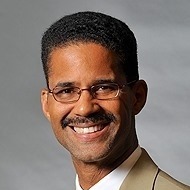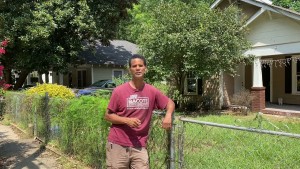APN Candidate Questionnaire: Samuel Bacote, III; District 5, Atlanta Council
 (APN) ATLANTA — In our continuing coverage of the 2021 City of Atlanta Municipal Elections, this article presents District 5 candidate Samuel Bacote, III (pronounced “Ba-coat”) and his questionnaire responses to Atlanta Progressive News.
(APN) ATLANTA — In our continuing coverage of the 2021 City of Atlanta Municipal Elections, this article presents District 5 candidate Samuel Bacote, III (pronounced “Ba-coat”) and his questionnaire responses to Atlanta Progressive News.
As a Board Member and the former Treasurer of the Development Authority of Fulton County, Bacote defended and supported a practice of giving controversial tax abatements to developers wishing to do business within Fulton County, despite little or no affordable housing units in the projects.
https://www.bizjournals.com/atlanta/news/2020/10/23/tax-incentives-samuel-bacote-fulton-county.html
https://www.developfultoncounty.com/viewpoint-tax-incentives-bring-more-tax-dollars-and-more-benefits-more-quickly/
Because developers were going around the City of Atlanta’s affordable housing policies to get funding from the Development Authority whenever they wanted to avoid paying taxes but not provide affordable housing, the City of Atlanta has had to adopt a reactive policy, requiring developers within City limits receiving funding from a development authority to provide the affordable units anyway.
Still, the Fulton County Development Authority continues to provide tax abatements without affordability requirements: this has encouraged developers to go outside City limits but within Fulton County limits to obtain the best financial terms for their projects.
This is suggestive that Bacote, if elected, would be pro-developer and may undermine the City’s affordable housing policy efforts.
 Incumbent Natalyn Archibong (District 5) is running for Council President, making the District 5 seat one of several open seats on the Council in the 2021 Municipal Election.
Incumbent Natalyn Archibong (District 5) is running for Council President, making the District 5 seat one of several open seats on the Council in the 2021 Municipal Election.
The candidates for District 5 are Bacote, Liliana Bakhtiari, Katie Kissel, Amanda “Mandy” Schmitt Mahoney, and Doug Williams.
https://atlantaprogressivenews.com/2021/08/27/atlanta-2021-candidate-qualifying-overview/
Bacote currently serves as the Vice-President of the Glenwood Park Community Association.
 Before moving to Glenwood Park, Bacote lived for more than a decade in Candler Park where, on behalf of Candler Park Neighborhood Organization, he was actively involved in planning and operating “Screen on the Green”, a series of outdoor movies, for several years.
Before moving to Glenwood Park, Bacote lived for more than a decade in Candler Park where, on behalf of Candler Park Neighborhood Organization, he was actively involved in planning and operating “Screen on the Green”, a series of outdoor movies, for several years.
Bacote has a BA in Economics from Morehouse College, an MBA from the University of North Carolina at Chapel Hill, and a Master’s in Public Administration from Harvard University’s Kennedy School of Government.
He co-founded American Electronic Entertainment–now based in Lithia Springs and one of the largest minority-owned sound, lighting and stage companies in the Southeast–while in high school.
In the early 1990s, Bacote served as a Peace Corps volunteer helping small businesses in Ghana, West Africa, receiving Presidential Honors under the George W. Bush and Bill Clinton Administrations.
He managed the three original Planet Smoothies in Orlando, Florida in the late 1990’s.
Today, Bacote is a mentoring partner of Tassili’s Raw Reality in Atlanta’s Historic West End.
He currently leads strategic planning efforts as Chairman of the Sadie G. Mays Rehabilitation Center.
For more than a decade, Bacote served as Chairman of Project Community Connections, Inc., a nonprofit resource opportunity center helping homeless people in Atlanta find permanent housing.
He was one of Atlanta’s first Trauma Intervention Program (TIP) volunteers.
He previously led the Fulton Atlanta Land Bank Authority as Chairman and CEO during a period of restructuring that supported more activity with community stakeholders.
He served as a director of the PATH Foundation, helping build a network of biking and walking trails throughout the Atlanta region.
He is a community board member at Hughes Spalding Children’s Hospital, helping bring attention to the special healthcare needs of children.
He is a former board member of Odyssey, and West End Neighborhood Development, Inc.; and a former Treasurer of the Atlanta Sister Cities Commission.
Bacote was one of the first Mayoral Appointees to the Westside Tax Allocation District Advisory Board.
He is a 2000 Leadership Atlanta Graduate and was a Marshall Memorial Fellow for emerging American leadership in the early 2000’s.
He is a former Big Brother through Big Brothers Big Sisters of Metro Atlanta.
Today, he serves as Chief Administrative Officer of Sigma Pi Phi Fraternity.
 In 2004, Bacote was selected by the Oprah Winfrey show as the Most Romantic Man in America.
In 2004, Bacote was selected by the Oprah Winfrey show as the Most Romantic Man in America.
https://www.youtube.com/watch?v=-FZC1BoGhQ4
In the 2017 Municipal Election for the District 5 seat, Liliana Bakhtiari received 49 percent of the vote, almost unseating Archibong.
APN published an interview in late 2020 with Bakhtiari when she announced that she would run again for District 5.
Recently, APN published Bakhtiari’s questionnaire responses:
APN also published Mahoney’s responses:
https://atlantaprogressivenews.com/2021/09/18/apn-candidate-questionnaire-mandy-mahoney-district-5/
APN has sent questionnaires to all District 5 candidates. However, neither Kissel nor Williams have responded to date.
Bacote’s questionnaire responses are as follows:
Policy 1: Homelessness/Criminal Justice Reform: Currently, the City of Atlanta Code of Ordinances criminalizes homelessness in various ways. One of these ways is the prohibition on monetary solicitation (panhandling) in large geographic areas called “Restricted Monetary Solicitation Zones” (RMSZ’s) Code, Part II, Ch. 106-85(11)… Would you support (again) repealing RMSZ’s, given that aggressive panhandling would still be banned and panhandling within ten feet of ATM’s, egresses, etc. would still be banned?
Yes.
Policy 2: Homelessness/Criminal Justice Reform: Currently, the City of Atlanta Code of Ordinances criminalizes homelessness in various ways. One of these ways is through curfew laws, making it a crime to be outside while under the age of eighteen during the hours of 11 p.m. and 6 a.m. Curfew laws currently exempt children or teens who are working, going to or from school, running an errand for a parent, etc. There currently are no exemptions for homeless or emancipated minors, putting them at risk for being arrested merely for being homeless or emancipated. Would you support amending Code, Part II, Ch. 106-227, to add exemptions from the curfew law for homeless minors and emancipated minors?
Yes.
Policy 3: Affordable housing: Currently, the City of Atlanta has an ordinance on the books requiring a housing inventory so that policymakers and the public will have good data regarding the City’s housing stock and the affordability of each housing unit, Code, Part II, Ch. 54-6. However, like many City policies, it is not being enforced. One obstacle to enforcement is lack of data. Would you support updating the City’s business license requirements contained in Code, Part II, Chapter 30, to require that any residential lessors required to have a business license, to provide annual data on the prices of their rental units within the City of Atlanta as part of their annual renewal paperwork?
Yes.
Policy 4: Democracy: Currently, the City of Atlanta Charter (Sec. 2-501) and Code of Ordinances (Part II, 2-40) provide for voter-initiated referenda, whereby a voter could come up with a policy and submit it to the Municipal Clerk; and if enough voters sign a petition, the policy will go on the ballot for citywide consideration. However, upon belief and knowledge, this process has never been used due to the high signature burden and other obstacles. Would you support reducing the petition requirement from fifteen percent of registered voters, to fifteen percent of actual voters (or potentially even lower)?
Yes.
For reducing the petition requirement below 15% of actual voters, it would help to define which elections are baselines. This has potential to become very fluid and are we talking about 15% of those who voted or just the number of voters and could it be signatures of any person or registered voters. Support it but want to define some of the key elements for transparency and better understanding.
Editor’s note: As stated, the proposal is to base the signature requirement on actual voters, not registered voters, as a way to reduce the number of signatures required. A baseline was not chosen but was assumed to be the last Municipal Election; this could be added.
Policy 5: Democracy: Currently, the City of Atlanta Charter (Sec. 2-501) and Code of Ordinances (Part II, Sec. 2-40) provide for voter-initiated referenda, whereby a voter could come up with a policy and submit it to the Municipal Clerk; and if enough voters sign a petition, the policy will go on the ballot for citywide consideration. However, upon belief and knowledge, this process has never been used due to the high signature burden and other obstacles. Would you support eliminating the requirement contained in Sec. 2-40 that the Municipal Clerk check that voters are up-to-date in paying their property taxes in order to sign a petition, a requirement which amounts to a quasi-poll tax?
Yes.
On surface, it seems extremely burdensome for a petitioner to know who has paid property taxes and really find it unfathomable that it’s policy though understand significance.
Editor’s note: The Petitioner would file the proposed Referendum Petition with the Municipal Clerk’s Office. Prospective signers of the petition would visit the Municipal Clerk’s Office to sign the petition and show their property tax payments paperwork. Thus, the burden, while still problematic and to some shocking, accrues to the signers of the petition and the Clerk, not to the original Petitioner.
Policy 6: Environment: Currently, there are seven Council Committees, but none prioritize environmental stewardship. Would you support amending the Code of Ordinances, Part II, Ch. 2-131 and 2-135 to create a new Standing Committee on the Environment, whose task will be to consider the environment first on all policy matters and advance environmental policy?
Yes.
Policy 7: Democracy / Public Comment: Currently, the Code of Ordinances allows Committee Chairs to restrict public comments to only items on the committee agenda. Do you support amending Code of Ordinances, Part II, Ch 2-136 to allow public comment on any matter within the subject matter purview of the Committee, whether or not the specific matter is not on the agenda of the committee (i.e. – a policy that the Committee is not currently considering but ought to consider)?
Yes.
Policy 8: Economy: Currently, the City of Atlanta relies primarily on expensive bond financing and other borrowing to fund capital-intensive initiatives. Cities and states around the country are exploring the possibility of launching public banks that would be used to fund things like affordable housing, small businesses, and solar panel installations, with low-interest loans. Would you support a Study Committee to launch a public bank in Atlanta?
Yes.
Policy 9: Affordable housing: Currently, the City has three Inclusionary Zoning zones, the Beltline Overlay, Westside Overlay, and Westside Park Overlay (Code, Part III, Part 16, Ch. 36A, Sec. 16-36A.004; Ch. 37, Sec. 16-37A.004; Ch. 41, Sec. 16-41A.004). The Beltline and Westside Overlays currently require developers to set aside either (a) fifteen percent of units as affordable at 80 percent of the Area Median Income (AMI) or below; or (b) ten percent at 60 percent of AMI. However, the Westside Park Overlay added a new compliance option, (c), where developers can set aside five percent of units at 30 percent of AMI or below. Would you support amending the Beltline and Westside Overlays to add this third option to serve low-income families in Atlanta?
Yes.
Policy 10: Environment: The City of Atlanta has yet to declare a climate crisis. Do you support passing a resolution declaring a climate crisis?
Yes.
Policy 11: Democracy / Transparency: Currently, Council Committees are struggling to meet the requirements of the Georgia Open Meetings Act, O.C.G.A. 50-14-1, et seq., especially when committee chairs call votes so quickly as to prevent the recording of vote details. Do you support amending Code, Part II, Sec. 2-133 to require committee chairs to call all votes in a manner that permits the committee analyst to record the mover, seconder, yeas, nays, abstentions, and absences for each vote?
Yes.
Policy 12: Democracy: Currently, members of the public have only two minutes to speak per person in Full Council Meetings. However, seniors are often observed struggling to make their comments within the allotted time. Research shows that cognitive processing time declines at age 67 a half standard deviation from the mean, and a full standard deviation at 79. (Murman, 2015; Ebaid et al., 2017; Emory University, 2019.) Would you support amending Code, Part II, Secs. 2-104, to provide additional public comment speaking time for seniors, and for persons with disabilities requiring reasonable accommodation: specifically, an additional minute for those seniors 67 and above; an additional two minutes for those above 79 (and an appropriate case-by-case accommodation for persons with cognitive or speaking-related disabilities)?
Yes.
Policy 13: Criminal Justice Reform: Currently, the City of Atlanta has higher penalties for drug crimes occurring within “Drug-Free Commercial Zones.” The Council recently rejected adopting a new Drug-Free Commercial Zone in District 4/West End because the zones tend to be in high-minority areas and because they send the wrong signal to police regarding proportionality of enforcement. However, the Council has not repealed the City’s existing Drug-Free Commercial Zones. Do you support repealing the existing zones contained in Code, Part II, Ch. 106-403, such that drug crimes will still be illegal in the City of Atlanta, but there will not be heightened enforcement or penalties in certain areas?
Yes.
Generally, enforcement of our drug laws should be even and consistent across our city. Carving out certain commercial zones creates opportunities for unfairly targeting drug activities of some, especially among our marginalized populations.
Policy 14: Affordable Housing: Currently, the City has three Inclusionary Zoning zones, the Beltline Overlay, Westside Overlay, and Westside Park Overlay (Code, Part III, Part 16, Ch. 36A, Sec. 16-36A.004; Ch. 37, Sec. 16-37A.004; Ch. 41, Sec. 16-41A.004). The Beltline and Westside Overlays currently require developers to set aside (a) fifteen percent of units as affordable at 80 percent of the Area Median Income (AMI) or below; or (b) ten percent at 60 percent of AMI or below. The Westside Park Overlay added a new compliance option, (c) where developers can set aside five percent of units at 30 percent of AMI or below. However, under this framework, a developer would choose only one price point for compliance with the affordability requirement, instead of providing a mix of incomes. To promote mixed-income communities, would you support, for large projects of fifty units or more, amending all three IZ areas to require a “3-3-3″ plan: at least three percent of units affordable at 80 percent AMI; at least three percent at 60 percent AMI; and at least three percent at 30 percent AMI?
Yes. As a part of imposing the “3-3-3″ plan, I would also want to hear from the affordable housing development community to be aware of any unintended impacts of potential projects.
Policy 15: Affordable Housing: Currently, the City of Atlanta has no consistent citywide policy around using zoning and land use incentives to negotiate voluntary commitments to affordable housing (i.e. – a Voluntary Inclusionary Zoning policy). The Code has a few zones with density bonuses that are under-utilized, because height would be a better incentive. Do you support amending Code, Part III, Part 16, Ch. 28, adopting a citywide Inclusionary Zoning policy to empower neighborhoods to self-designate as Height Bonus Areas, whereby development projects would be eligible for additional height by providing affordable housing units?
Yes.
Policy 16: Democracy / NPU’s: Currently, NPU’s are empowered to make recommendations regarding any matter of public policy to the City of Atlanta, per Code, Part III, Part 6, Sec. 6-3013(c). However, the Department of Planning only routinely communicates recommendations regarding only certain zoning matters and other specific categories of policy matters, to the City Council and the Mayor. This means it is up to each NPU to communicate their recommendations to the Atlanta City Council and Mayor. Do you support amending the Code to require the Department of Planning to provide a monthly report to the Atlanta City Council of all NPU votes on matters not otherwise included on the Full Council Meeting Agenda; and that this monthly report shall be included in any Full Council Meeting Agendas as an attachment for any meetings that fall within that month?
Yes.
Policy 17: Democracy / NPU’s: NPU’s make recommendations regarding policy to the City Council, but NPU’s do not (and legally cannot) have veto power over City Council decisions with which they do not agree. However, NPU’s often wonder whether Council Members are listening to them, especially when Council Members go against the wishes of one or more NPU’s. Would you support the creation of a “Responsive Statement to Neighborhoods” – whereby one or more Councilmembers may provide an optional statement called a Responsive Statement to Neighborhoods, by which they explain how they considered the input of one or more NPU’s with respect to one or more legislative items; and all Responsive Statements to Neighborhoods shall be attached to the appropriate meeting agendas?
Yes.
Policy 18: Democracy / NPU’s: Currently, the Code allows NPUs to utilize representative voting whereby individual residents and businesses lose their individual voting rights to vote on matters at NPU meetings; and whereby, in certain NPU’s, only neighborhood association delegates and business community delegates vote on what recommendations to make to the City Council. (Code, Part III, Part 6, Sec. 6-3012(3). Do you support repealing the language allowing “representative voting” in NPUs, restoring the principle of one person-one vote?
Yes.
(END / Copyright Atlanta Progressive News / 2021)